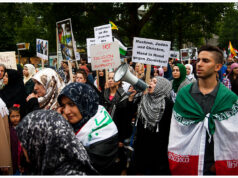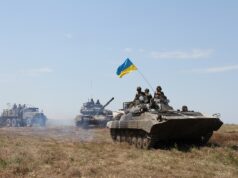“It seems like it’s rainin’ all over the world
“I feel like it’s rainin’ all over the world.”
— Brook Benton
On Sept. 2, Russian President Dmitry Medvedev stated that Georgian President Mikheil Saakashvili is irrelevant and a “political corpse.” Last week, Medvedev recognized the independence of South Ossetia and Abkhazia and announced Moscow’s intention to bring the territories under Russian rule. Western leaders have condemned this action as a violation of Georgian sovereignty and argue such recognition undermines the Russian-Georgian cease-fire. In response, Georgia has severed ties with Russia.
The Russia-Georgia conflict cannot be viewed simply as a battle between two Eastern European nations. The conflict is symbolic of Russian reaffirmation as a major global power that seeks to challenge the West and gain influence in the former Commonwealth of Independent States. Russia under Prime Minister Vladimir Putin views itself as a viable alternative to the United States and the West, and it is demonstrating this by trading with oppressive, nondemocratic regimes including Sudan, Iran, Syria, Venezuela and Hamas.
Russia’s overreaction and occupation of Georgia makes it appear as if Moscow had planned this for some time and was merely waiting for an excuse to invade its western neighbor. Georgia underestimated the brutal Russian response and overestimated Western sympathy and willingness to help.
Putin ordered the Russian invasion of Georgia to inflict heavy causalities in order to dissuade Georgia and, especially, Ukraine from aligning with the West. Putin does not want Georgia or Ukraine to join NATO and hoped that by overreacting and thrashing Georgia, those countries, along with other CIS, might think twice about seeking closer cooperation with the West.
Putin’s Russia ignored demands from the West to cease hostilities and displayed an arrogance that it could do whatever it pleased without consequences. On Aug. 14, Russian Foreign Minister Sergey Lavrov declared, “Georgia could forget about getting back its two provinces” — South Ossetia and Abkhazia. Putin’s gambit, so far, has been successful. The West did not come to aid Georgia, and essentially gave lip service to Putin.
Putin’s Russia also sensed no reprimand or reprisal form the West when it threatened to attack Poland. Gen. Anatoly Nogovitsyn exposed Russia’s expansionist intentions when he remarked about the Polish-U.S. missile defense pact, “Poland, by deploying (the missile system), is exposing itself to a strike — 100 percent.” Is the threat of a Russian gas embargo that great that Europe is basically silent?
Many Arab states refrained from publicly taking sides during the fighting, perhaps to gauge if the West would respond militarily against Russia. Syria viewed Western reluctance to exert serious pressure on Russia as a sign of impotency and weakness. Syrian President Bashar Assad not only praised Russia for handling the conflict, but flew to Moscow to affirm his support with President Medvedev. On Aug. 21, Russia agreed to supply Syria with new defensive weapons and Iskander missile defense systems. As Syria was once the greatest Middle Eastern recipient of Soviet aid, the renewal of Syrian-Russian cooperation is an ominous sign of a relapse in Cold War alliances.
Most Americans and other Westerners are unfamiliar with the history and geography of Georgia and do not realize that Georgia represents a rare beacon of freedom and democracy in a region comprised primarily of ex-Soviet, nondemocratic states.
The tactic of fear and intimidation is working. The latest clash between Russia and Georgia is a decisive victory for Moscow. The U.S. military is too occupied in Iraq and Afghanistan to commit to a war against Russia. The European Union does not want to send troops to fight because Russia is a major trading partner. The EU imported 143.5 billion (euro), chiefly natural gas and minerals, and 11.5 billion (euro) in services in 2007. Economics is a big factor for European reluctance to stand up against Russia, and Putin views this as a major Russian victory. Do we have yet another country conducting foreign policy through the fear of economic retaliation?
It seems there is no short-term solution to the current crisis. In all probability, the Russians will withdraw their forces to South Ossetia, and there will not be a response from the West. Although most people think Russia overreacted, used excessive force and should have resorted to diplomacy, Western failure to effectively pressure Russia has emboldened Moscow to pursue its expansionist ambitions and undermined U.S. efforts at promoting freedom and democracy.
Michael Sharnoff is a research associate at the Jewish Policy Center





